

Curating the 1981 Springbok tour
Aug 15, 2021
By Ian Brailsford
The fortieth anniversary of the 1981 Springbok tour has prompted several New Zealand museums, galleries, and libraries to organise commemorative displays, public talks, and film screenings to mark the event and the University of Auckland’s Special Collections is no exception.
Initial searches within our published and archival collections revealed active collecting by the General Library in its ‘vertical file’ of ephemera on the topic of sporting contacts with South Africa from the early 1960s onwards. Printed materials from groups such as the National Anti-Apartheid Committee, CARE (Citizens’ Association for Racial Equality) and HART (Halt All Racist Tours) had been preserved in the vertical file under the heading ‘Race relations’. For example, we located this 1965 CARE pamphlet opposing that year’s Springbok tour to New Zealand in addition to many items chronicling opposition to the 1970 and 1976 All Blacks tours to South Africa. We lacked, however, historic materials documenting either support for the tours or arguing that sport and politics should be kept at arm’s length. In effect, a Springbok display meant an ‘opposition to the tour’ display.
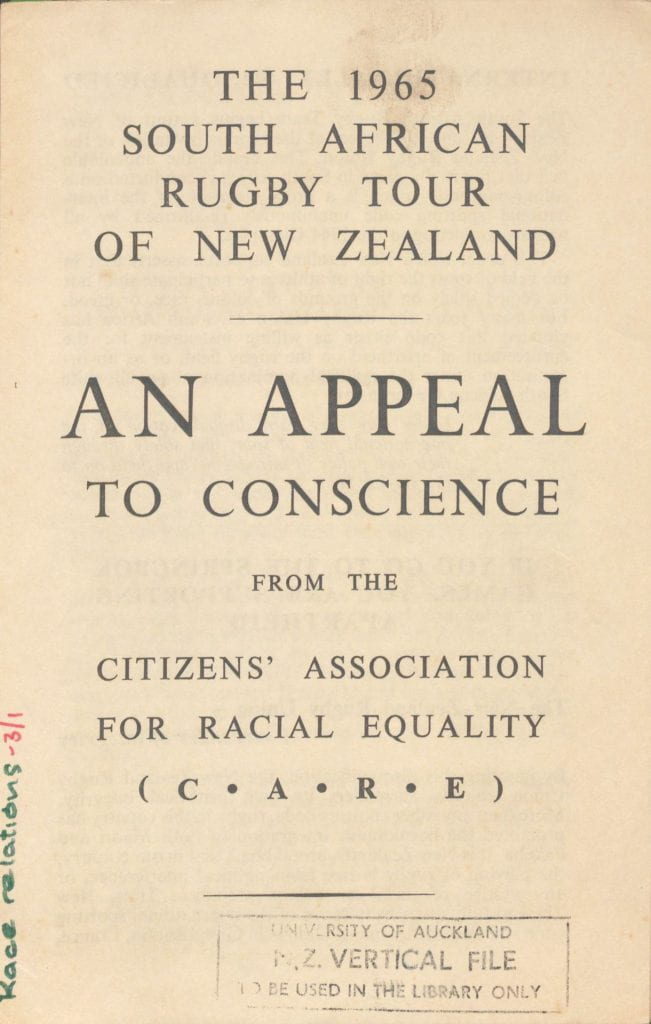
1965 CARE pamphlet, General ephemera collection, MSS & Archives 2015/23, Special Collections, University of Auckland Libraries and Learning Services.
With only three display cases to work with, however, we decided that although the 1981 tour was part of a longer history of anti-apartheid organising in New Zealand we would focus on the autumn, winter, and early spring of 1981.
With our extensive holdings relating to the University of Auckland we expected to find items that would speak to a student audience. In our university photography collection, we found a black and white print of two students, Sara Noble and Kevin Hague, in the Student Union ‘Quad’ staging a hunger strike against the tour in a ‘Bantu hut’ constructed of wood and corrugated iron. We located the photo in the New Zealand Herald which ran with the story of the protest on 29 April and included this in the display. [1]
The Springbok tour dominated the pages of the student association weekly newspaper Craccum during 1981. The Craccum issue following the final test match at Eden Park on 12 September, for instance, featured a four-page photo montage ‘Tour souvenir lift out’. [2]
However, the one time a vote was held on campus among the student body relating to the tour, in August 1981, a small majority of students (1740 to 1735) voted against a motion proposing that student association funds be allocated to pay for anti-tour activities. [3] While the tour is sometimes seen as a generational divide, the fact that a significant number of University of Auckland students opposed funding anti-tour ventures indicates it was more nuanced than this.
The centrepiece of our display is an archival item, the story of which teases out some of the complexities surrounding the tour. The General Library in February 1982 received a copy of an anti-tour ‘letter of unwelcome’ petition for depositing in the archives. It’s a hardbound copy of the petition catalogued as MSS & Archives A-241, with the snappy title ‘Letters to the people of South Africa from citizens of Auckland and citizens of Dunedin to the South African Rugby Board Museum’.
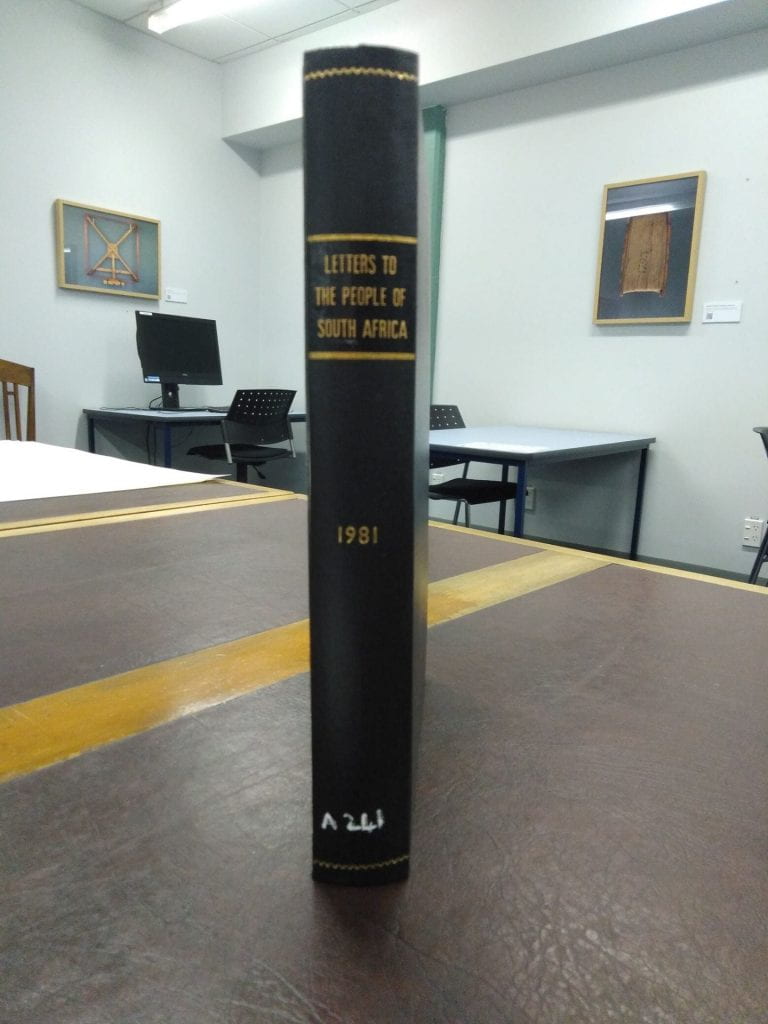
Bound copy anti-tour petition, MSS & Archives A-213, Special Collections, University of Auckland Libraries and Learning Services.
The origin of the petition was a letter of welcome to the Springbok touring party when they arrived in Invercargill for a match against Southland on Saturday 8 August. Over 1,300 Southland residents had signed the letter and Springbok tour manger, Dr Johan Claassen, promised to preserve it in the Rugby Board’s museum when he returned home to South Africa. The New Zealand Herald quoted Southland resident Carolyn Springwater, who handed over the letter to the team, as being ‘very upset’ by the way the Springbok tourists had been treated in other parts of New Zealand. [4] Here was archival evidence of New Zealanders who supported the tour but one that had (most likely) gone offshore.
Our ‘letter of unwelcome’ petition was a direct response to the Southland welcome letter. The petition was started in mid-August by Remuera mother and daughter Jenny and Rebecca Hanify, as a ‘personal protest’ against the tour. They wanted to create a lasting memento to sit alongside the Southland letter in the Rugby Board museum. In total more than 3,500 Auckland and Dunedin residents signed in one month. Two of the first signatures were the former Auckland Mayor Dove-Myer Robinson and incumbent Colin Kay. Rebecca Hanify was quoted in the Auckland Star saying that she was against apartheid, but she didn’t, ‘think it’s necessary to get involved with any of these big protest organizations and I don’t want to go out and break the law’. [5]
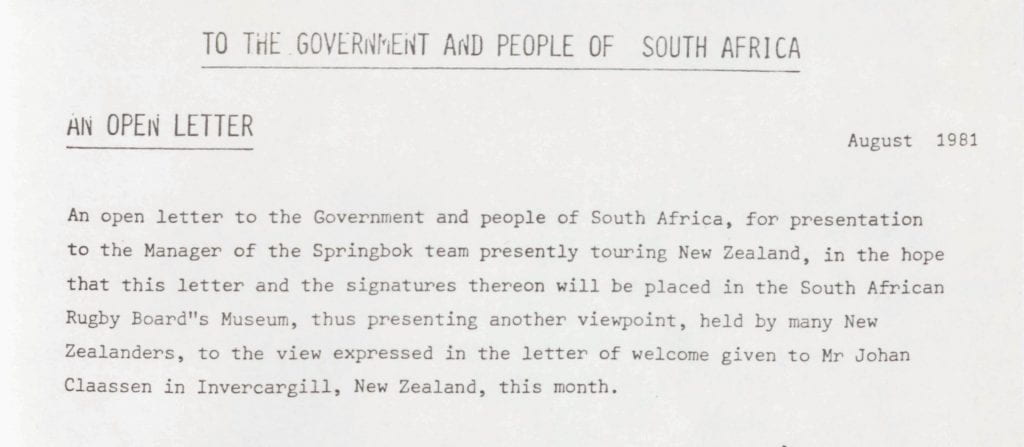
Opening text of anti-tour petition, MSS & Archives A-213, Special Collections, University of Auckland Libraries and Learning Services.
The original copy of the petition was mailed to South Africa in September 1981. A further letter in our collection from March 1982 indicates that it reached South Africa, but the South African Rugby Board refused to accept it. If the original is lost, then our copy of the petition is the only one left.
Tantalisingly, the Springbok Experience Rugby Museum in Cape Town closed in 2019, so tracking down whatever happened to both letters – welcome from Southland and unwelcome from Auckland and Dunedin – is proving difficult. We have the hope that displaying the item, writing about it on the library’s website and on this blog might trigger someone’s memory. We would also like to hear from the Hanify family so they can revisit their contribution to our collective memories of the 1981 Springbok tour.
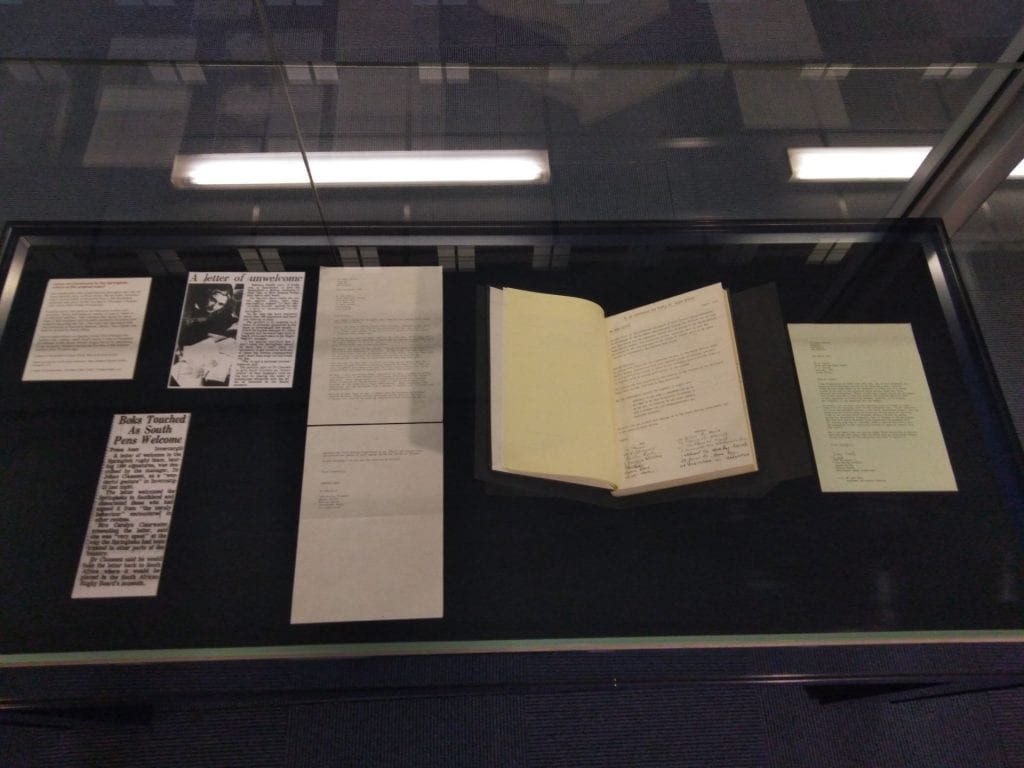
Display case featuring petition and associated items.
[1] ‘Hunger as tour protest’, New Zealand Herald, 29 April 1981, p.16.
[2] ‘Tour souvenir liftout’, Craccum, Vol. 55, No. 21, 15 September 1981, pp.11-14.
[3] ‘No one wins’, Craccum, Vol. 55, No. 20, 8 September 1981, p.4.
[4] ‘Boks touched as south pens welcome’, New Zealand Herald, 8 August 1981, p.3.
[5] ‘A letter of unwelcome’, Auckland Star, 9 September 1981, p.3
- Home Kāinga
- Our Story Ngā Kōrero
- Our Tours Ngā Haerenga
- Wellington Museum Te Waka Huia o Ngā Taonga Tuku Iho
- Space Place Te Ara Whānui ki te Rangi
- Nairn Street Cottage
- Cable Car Museum
- Careers Umanga
- What’s On Ngā Kaupapa Whakatairanga
- Museum Blog
- Our Venues Ngā Wāhi
- Venues at Wellington Museum Ngā Wāhi i Te Waka Huia o Ngā Taonga Tuku Iho
- Venues at Space Place Ngā Wāhi i Te Ara Whānui ki te Rangi
- Birthday Parties Ngā Pāti Rā Whānau
- Recommended Caterers Ētahi Kaitaka Kai
- Education Blog Rangitaki Mātauranga
- Space Place
- Wellington Museum
- Space Place Wāhi Haumaru
- Venues at Space Place Ngā Wāhi i Te Wāhi Haumaru
- Support Us Tautoko
- Museum Blog Te Kāpata Te Curio
Remembering the 81′ Springbok Tour
40 years on, we look back and talk to two Wellington residents who remember those turbulent times.
“All for the sake of a Rugby game. Doesn’t make sense does it?” – Liz Roberts
During the winter of 1981, violent clashes between rugby supporters, protesters and the police erupted all over Aotearoa in one of our country’s most tumultuous periods. The Springbok rugby tour brought us to the brink of civil war, as many protested the racial segregation of Apartheid South Africa and made links to racism at home.
On the 29th of July, 1981, protesters opposing the Springbok Tour were met by baton-wielding police trying to stop them marching up Molesworth St to the home of South Africa’s Consul to New Zealand.
This was the first time police had used batons against protestors, and the violence horrified many New Zealanders. Former Prime Minister Norman Kirk’s prediction eight years earlier that a tour would result in the ‘greatest eruption of violence this country has ever known’ seemed to ring true.
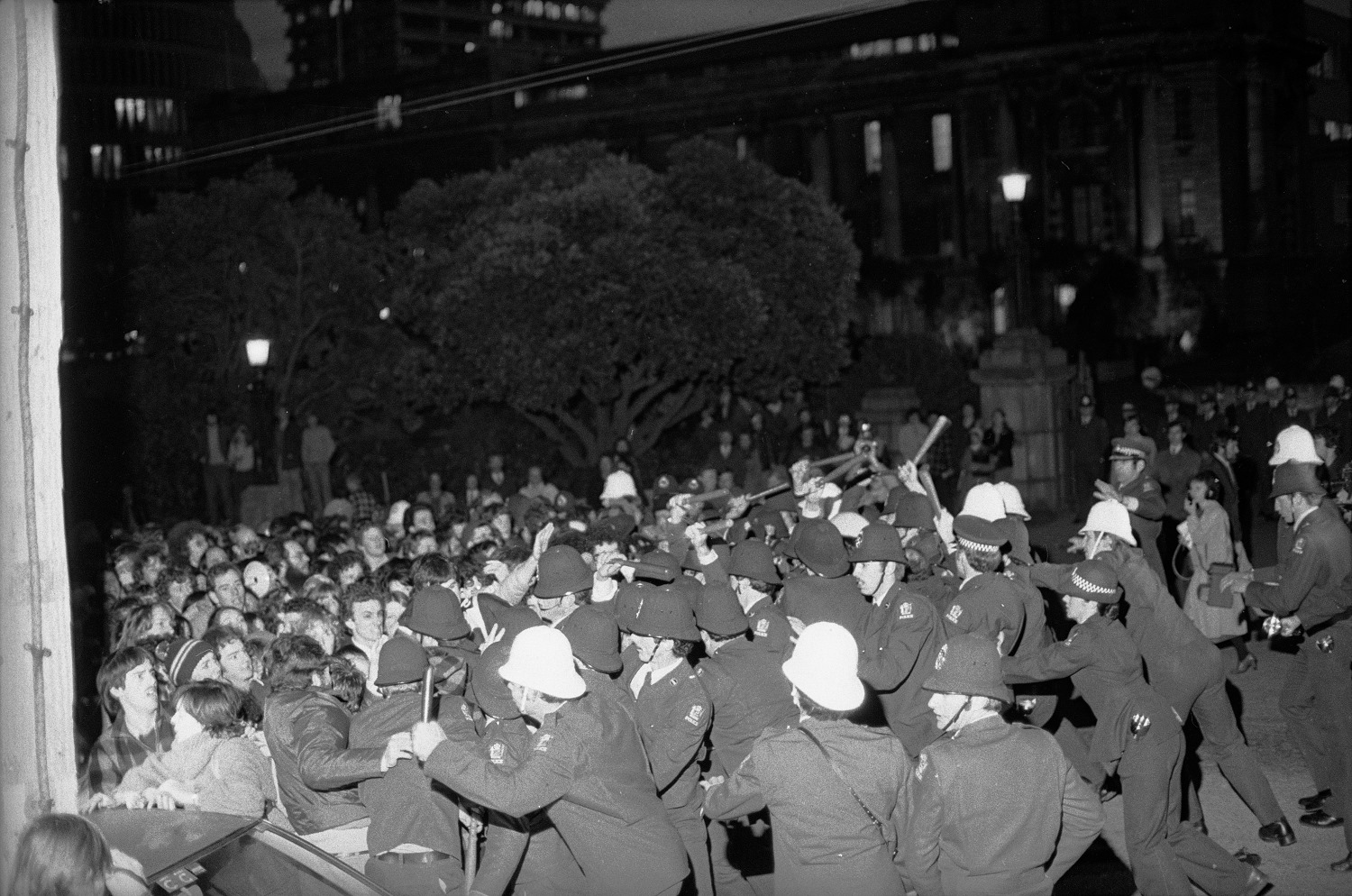
Wearing helmets like this one, 7000 protesters gathered in central Wellington and around Athletic Park on 29th of August 1981 to stop pro-tour supporters from gaining access to the second test match. Once again the police intervened, this time using long batons, with many protesters injured as a result. This helmet was worn by Anne Bogle during other anti-tour protests.
The Merata Mita Estate permitted us to use the Wellington footage from PATU! (1983) – the powerful documentary directed by Merata Mita which shows the harrowing events of the 1981 Springbok Tour.
Ngā Taonga Sound and Vision meticulously restored and preserved the original documentary for the 40th anniversary. With their approval, we were able to use their newly restored and remastered version for these videos.
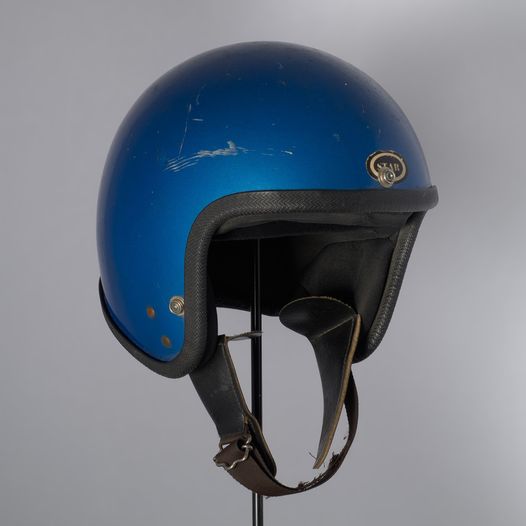
Liz Roberts lived on Te Wharepōuri Street in Berhampore, close to Athletic Park, and recalls the events of the 2nd Test on August 29th, 1981, where she saw protesters clash with Police on her street.
Anne Bogle was a young Victoria University student studying Law and History in 1981 – and attended a number of Anti-Tour protests in Wellington – she took part in the protest group that blocked the Wellington Motorway on July 25th and the infamous Molesworth Street incident a few days later on July 29th. The protester helmet she used during the anti-tour demonstrations is currently displayed at Wellington Museum.
Thank you to the Merata Mita Estate for their permission to use parts of the film and also to Ngā Taonga Sound and Vision for their great mahi on the preservation and restoration of this important piece of film taonga .
Also thank you to Anne Bogle and Liz Roberts for sharing their stories.
Pin It on Pinterest
Navigation for Afternoons
Sound Archives: The Springbok Tour that Never Was
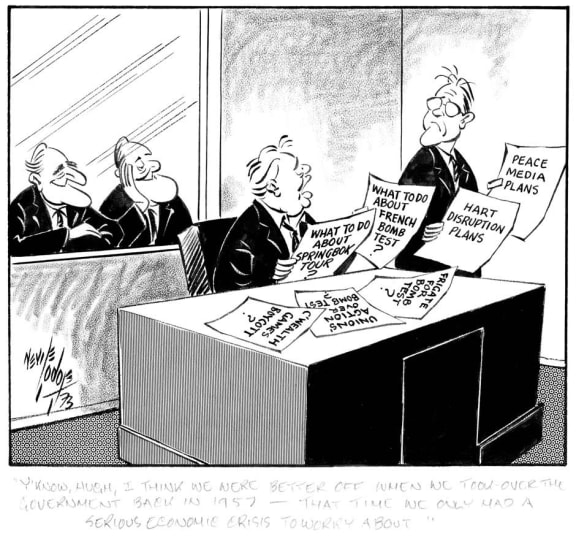
1973 Neville Lodge cartoon in the Evening Post newspaper on the problems facing Norman Kirk’s new Labour government [Alexander Turnbull Library]
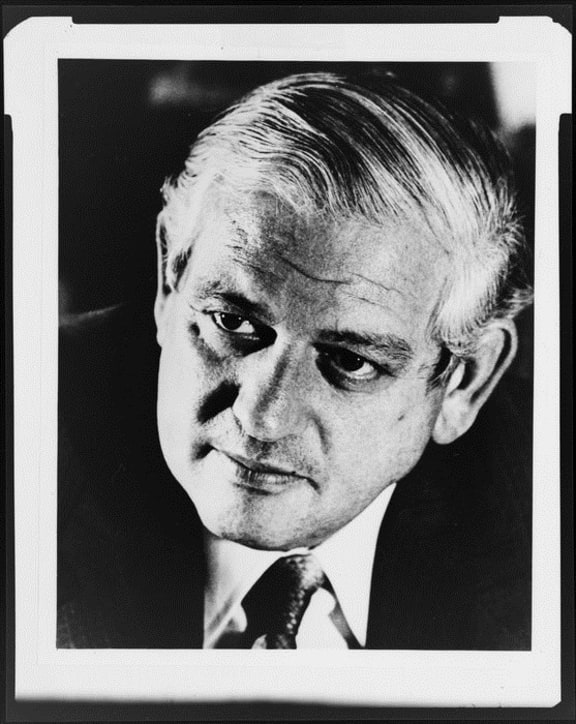
Portrait of Norman Kirk, 1973 by K E Niven and Co [Alexander Turnbull Library]
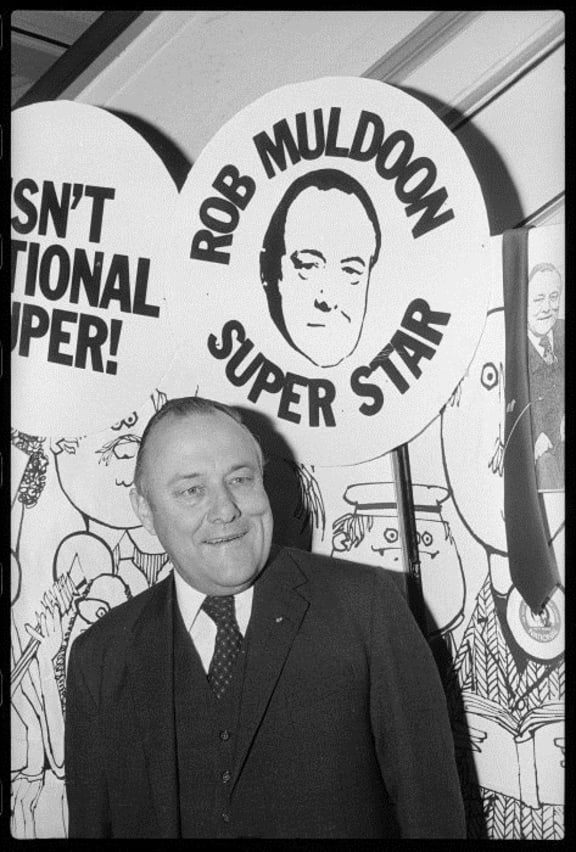
National Party leader Rob Muldoon at the party's annual conference, 1975. Evening Post newspaper [Alexander Turnbull Library]
The images in this gallery are used with permission and are subject to copyright conditions.
Anti-Springbok tour cartoon, 1981

About this item
This anti-tour cartoon suggests that the New Zealand police were behaving in the same way as their counterparts in South Africa.
What can I do with this item?
Check copyright status and what you can do with this item
Report this item
If you believe this item breaches our terms of use please report this item
DigitalNZ brings together more than 30 million items from institutions so that they are easy to find and use. This information is the best information we could find on this item. This item was added on 20 April 2012 , and updated 11 April 2024 . Learn more about how we work.

What is the copyright status of this item?

All Rights Reserved
This item is all rights reserved, which means you'll have to get permission from Manatū Taonga, the Ministry for Culture and Heritage before using it.

More Information
Manatū Taonga, the Ministry for Culture and Heritage has this to say about the rights status of this item:
All text is licensed under the Creative Commons Attribution-NonCommercial 3.0 New Zealand Licence. Commercial re-use may be allowed on request. All non-text content is subject to specific conditions.
You must always check with Manatū Taonga, the Ministry for Culture and Heritage to confirm the specific terms of use, but this is our understanding:

Non-infringing use
NZ Copyright law does not prevent every use of a copyright work. You should consider what you can and cannot do with a copyright work.

You may not copy and/or share this item with others without further permission. This includes posting it on your blog, using it in a presentation, or any other public use.

No modifying
You are not allowed to adapt or remix this item into any other works.

No commercial use
You may not use this item commercially.
Related items
- International edition
- Australia edition
- Europe edition
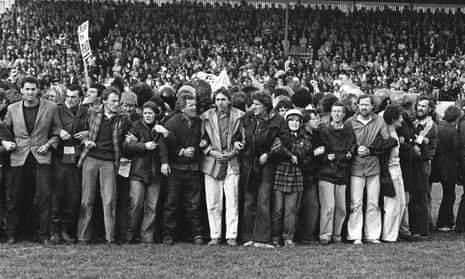
Rugby, racism and the battle for the soul of Aotearoa New Zealand
The Springboks’ tour and the protests that ensued 40 years ago helped set the fight for Māori rights on a stronger path
The 1981 Springbok rugby tour of New Zealand will always have a special place in any narrative about the international fight against apartheid in South Africa.
The protests against the Springboks reverberated around the world – delivering a savage psychological blow to South Africa’s white regime while giving a resounding boost to the oppressed majority.
This weekend marks the 40th anniversary of the first rugby Test of the Springboks’ tour of New Zealand in Christchurch, but well before that game was played, the political significance of the visit had eclipsed any results on the field.
Three weeks before the first Test, the second game of the tour was to be played in Hamilton, and white South Africans in their droves got out of bed in the middle of the night to watch the first ever live telecast of a rugby game in the country.
It was to be a special moment in South Africa, but not as expected. Instead of the Springboks vs Waikato game, fans saw 300 protesters linking arms in the middle of Hamilton’s Rugby Park – declaring they would not leave till the tour had been called off.
The anger that swept through white South Africa was nearly as palpable, if not as physical, as the anger expressed on Hamilton’s streets in the ensuing hours.
On South Africa’s Robben Island, Nelson Mandela was spending his 18th year in jail. He said when the prisoners learned that an anti-apartheid protest had stopped the game, they were jubilant. They grabbed the bars of their cell doors and rattled them around the prison; he said it was like the sun came out.
Here in Aotearoa New Zealand, the tour protests also had a profound impact, although this took longer to play out. It was the closest we had come to civil war since the 19th century land wars, but more importantly the tour shone a harsh spotlight on racism in this country. Māori activists asked how could we be concerned about racism 10,000km away and ignore it in our own backyard? Fair question.
In the aftermath of the tour, racism took centre stage with an intense public debate that helped set Aotearoa New Zealand on a new path.
A decade earlier, Māori activist groups like Ngā Tamatoa (the young warriors) had challenged the Pākehā (European) majority about patronising attitudes and lazy racism that meant Māori were in effect second-class citizens.
Politicians are slow followers of public opinion, but four years after the tour and the wide discussion and debate it helped spur, the Waitangi Tribunal was given the responsibility to investigate historic breaches of the Treaty of Waitangi – previously the tribunal had only been mandated to look at possible future breaches. And so began its investigations into our history of racism and oppression and the injustices of colonisation, which continue to resonate for Māori in the present.
Since then numerous positive developments have given a stronger political voice to Māori.
In our most recent budget, the health minister, Andrew Little, announced the formation of a national Māori health authority that will have the power to contract health services for Indigenous New Zealanders where the state system has served them poorly. “By Māori, for Māori” is seen as a way to enhance our democracy with a turn away from the “tyranny of the majority”, under which they have fared poorly.
It’s not all plain sailing though, and recent debate about Māori rights to representation on local councils has met hostile, albeit minority, opposition.
But the direction continues to be forward and work is under way to incorporate the history of colonisation in these South Pacific islands into the school curriculum.
The irony in these positive developments is that the overall situation for most Māori is getting worse, with New Zealand’s Indigenous people disproportionately affected by poverty and inequality, which continues to grow relentlessly with the pandemic.
The civil disruption from the tour and the debate that followed benefited both New Zealand and South Africa in ways that we didn’t see at the time. We are a better country for it.
John Minto was national organiser of Halt All Racist Tours (HART) in 1981 and is currently the national chair of Palestine Solidarity Network Aotearoa.
- New Zealand
- Asia Pacific
- Rugby union
Most viewed

IMAGES
COMMENTS
Cartoons. Editorial cartoons were able to give voice to the strong opinions and social fallout of a divided nation during the 1981 Springbok Tour and the anti-Sprinbok tour protests. These six cartoonists illustrate some of the differing perspectives, key players, and huge impacts in the lead up to, during, and after the tour.
The Springbok Tour. The springbok tour of the 1980's was the largest civil disturbance New Zealand had seen in thirty years. The whole of New Zealand was divided over the tour, this division of the country lasted over fifty days. The Springbok tour was a real factor in the way New Zealand grew as a county. The outcomes that arose from the ...
Anti-Springbok tour cartoon, 1981. Policing the 1981 Springbok tour, cartoon. My old man's an All Black. Barricade at Invercargill, 1981 Springbok Tour. Cavaliers rugby tour, 1986. Anti-apartheid demonstrator, 1970. The Montreal Olympics boycott. Protest outside South African consulate.
1981 Springbok tour Page 1 - Introduction. A country divided. For 56 days in July, August and September 1981, New Zealanders were divided against each other in the largest civil disturbance seen since the 1951 waterfront dispute. More than 150,000 people took part in over 200 demonstrations in 28 centres, and 1500 were charged with offences ...
This image Appears In 1 Article: 1981 Springbok tour. protest. police. springboks. cartoon. 1980s. Some felt that the New Zealand Rugby Football Union should have to pay the bill for policing the tour out of the profits they made from the matches.
Divided loyalties Springbok tour cartoon Content partner Manatū Taonga, the Ministry for Culture and Heritage Collection NZHistory Description. This Eric Heath cartoon, which appeared in the Dominion in September 1981, illustrated how the nation divided into two distinct camps regarding the tour. Format Image Contributing partner NZHistory URL
About this item. Title. Policing the 1981 Springbok tour, cartoon. Content partner. Manatū Taonga, the Ministry for Culture and Heritage. Collection. NZHistory. Description. Some felt that the New Zealand Rugby Football Union should have to pay the bill for policing the tour out of the profits they made from the matches.
Divided loyalties Springbok tour cartoon. This Eric Heath cartoon, which appeared in the Dominion in September 1981, illustrated how the nation divided into two distinct camps regarding the tour. Share this item.
The South African tour of New Zealand in 1956 saw the tide of Springbok supremacy turn and ebb towards the shores of the land of the long white cloud. The green and gold machine had never been defeated in a test series anywhere in the world since 1896. In the two previous tours by the Springboks to New Zealand they had drawn one series (1921 ...
The Springbok tour dominated the pages of the student association weekly newspaper Craccum during 1981. The Craccum issue following the final test match at Eden Park on 12 September, for instance, featured a four-page photo montage 'Tour souvenir lift out'.[2] However, the one time a vote was held on campus among the student body relating ...
The Springbok rugby tour brought us to the brink of civil war, as many protested the racial segregation of Apartheid South Africa and made links to racism at home. On the 29th of July, 1981, protesters opposing the Springbok Tour were met by baton-wielding police trying to stop them marching up Molesworth St to the home of South Africa's ...
The cartoon shows a man representing the N.Z.R.F.U. with another man on his shoulders, representing New Zealand freedom. He is walking along a tight-rope head to head with Robert Muldoon who has a man on his shoulders representing New Zealand conscience. Refers to the debate over the 1981 Springbok tour. Negatives at PA Collection 5371 Bromhead Collection Inscriptions: bottom right - The ...
Throughout 1981, plans by the New Zealand Rugby Union to host a rugby tour from apartheid South Africa faced growing public opposition (New Zealand prime minister. Despite calls for the tour to be scrapped, the all-white Springbok team arrived in July. The anti-apartheid demonstrators responded by mobilising a mass protest movement to disrupt the tour.
Anti-Springbok tour cartoon, 1981. Barricade at Invercargill, 1981 Springbok Tour. Cartoon from 1965 Springboks series. Norman Kirk. Divided loyalties Springbok tour cartoon. Protest against the 1970 Springbok tour. Riot 111 - subversive radicals. School children protesting, 1981 Springbok tour.
In today's trip to the sound archives of Nga Taonga Sound & Vision we will hear about the Springbok tour that never happened and the reaction of Kiwi rugby fans, which set the scene for the showdown of the 1981 Springbok Tour. ... 1973 Neville Lodge cartoon in the Evening Post newspaper on the problems facing Norman Kirk's new Labour ...
Protesters in Hamilton during a demonstration against the 1981 Springbok tour - Photograph taken by Phil Reid. Kennedy, Ronald E (Ronken), fl 1981 :Political Diversion. Bok Tour '81. Floating vote 1981. Our economic situation. ca. 1968-1981. Heath, Eric, 1923- :The Tour. Political advantage. 3 August 1981.
Nothing playing. RNZ National. All Night Programme
Read a story about the 1981 Springboks rugby tour. The 1981 Springbok rugby tour of New Zealand caused social ruptures within communities and families across the country. With the National government backing the tour, protests against apartheid sport turned into confrontations with both police and pro-tour rugby fans — on marches and at matches.
In this Nevile Lodge cartoon, which appeared in the Evening Post in 1973, the prime minister, Norman Kirk, and his deputy, Hugh Watt, are discussing the problems the new Labour government faces. The proposed Springbok tour looms large among them. Through the window the leader of the Opposition, Jack Marshall, and his deputy, Robert Muldoon, look on smugly.
About this item. Title. Anti-Springbok tour cartoon, 1981. Content partner. Manatū Taonga, the Ministry for Culture and Heritage. Collection. NZHistory. Description. This anti-tour cartoon suggests that the New Zealand police were behaving in the same way as their counterparts in South Africa.
The Springboks' tour and the protests that ensued 40 years ago helped set the fight for Māori rights on a stronger path Sat 14 Aug 2021 19.27 EDT Last modified on Wed 19 Oct 2022 13.17 EDT Share